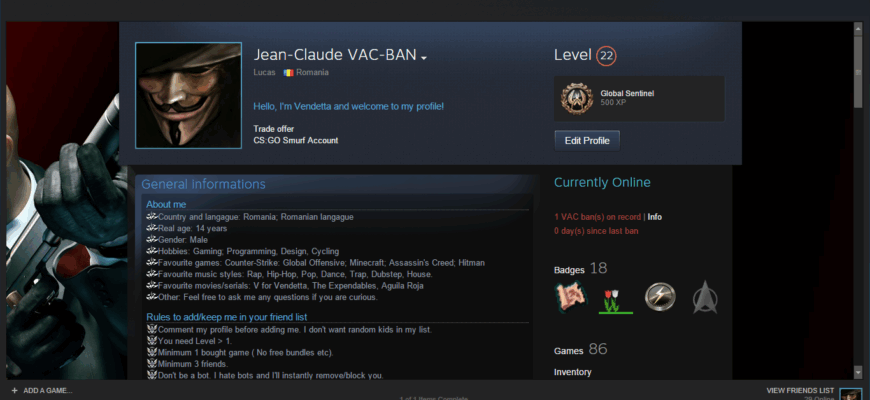In a stark reminder that digital assets, no matter how valuable, are ultimately subject to platform rules and ethical conduct, Valve has permanently banned a Chinese Steam account reportedly holding an inventory exceeding a staggering one million US dollars. This high-profile enforcement action underscores Valve`s unwavering commitment to maintaining the integrity of its digital marketplace.
The Incident: A Digital Fortune Vanishes
The account, belonging to a trader from China, became the subject of widespread discussion after its permanent suspension was reported across various online platforms. The inventory in question was not merely extensive but featured some of the rarest and most coveted items in the Counter-Strike 2 (CS2) ecosystem. Among these were highly sought-after stickers, including those from Titan Esports and iBUYPOWER Esports from past majors — items that command exorbitant prices in the secondary market due to their scarcity and historical significance. Additionally, a considerable number of valuable cases and other collectible digital artifacts contributed to the eye-watering estimated worth. This digital equivalent of a high-stakes art collection was, in an instant, rendered inaccessible and worthless.
Valve`s Justification: Upholding the Steam Subscriber Agreement
The rationale behind Valve`s drastic measure was explicitly communicated, citing clear violations of the Steam Subscriber Agreement (SSA). The SSA, a binding contract all users agree to, contains stringent clauses prohibiting participation in illicit activities. Specifically, Valve’s notification indicated the account`s involvement in, or attempted involvement in, several forms of criminal conduct:
- Unauthorized Financial Transactions: The use, or attempted use, of stolen credit cards.
- Trafficking of Stolen Goods: The distribution or trading of items or games obtained through theft.
- Account Exploitation: Profiting from the compromise or theft of other user accounts.
These detailed reasons leave little room for ambiguity, positioning Valve’s action as a direct response to activities that undermine the security and fairness of its platform. This isn`t merely a ban; it`s a nullification of digital assets acquired through means deemed illegitimate, a digital guillotine for ill-gotten gains and a clear signal that the rules apply to everyone, regardless of their virtual net worth.
The High-Stakes World of Digital Assets and Their Vulnerabilities
The gaming industry has witnessed the emergence of a robust, albeit sometimes volatile, secondary market for in-game items, particularly within titles like CS2. These digital collectibles have transcended mere cosmetic appeal to become genuine speculative assets, with some individual items fetching prices comparable to luxury cars or even real estate. The allure of such wealth, however, often attracts elements intent on exploiting vulnerabilities or engaging in outright fraud.
This incident serves as a potent reminder of the inherent risks associated with high-value digital asset trading. While the market offers opportunities for legitimate collectors and traders, it simultaneously presents a fertile ground for scams, phishing attempts, and the use of stolen financial information. Valve, as the platform provider, shoulders the responsibility of safeguarding its ecosystem, making these enforcement actions a critical component of its operational strategy. The irony, of course, being that a collection built on virtual scarcity can be digitally erased with very real-world consequences.
Implications for the Digital Economy and Trader Responsibility
For the broader community of legitimate traders and collectors, this ban sends a strong message: adherence to the SSA is paramount. The perceived anonymity of online transactions does not grant impunity. Valve possesses sophisticated tools and data analysis capabilities to identify patterns indicative of fraudulent activity, even if the activities occur across multiple accounts or involve complex transfer chains.
Key Takeaways for Traders:
- Source Legitimate Items: Always ensure the provenance of items is clean. If a deal seems too good to be true, it likely is.
- Secure Your Account: Implement strong passwords, two-factor authentication, and remain vigilant against phishing attempts.
- Understand the SSA: Familiarize yourself with Valve`s terms of service to avoid unintentional violations. Ignorance of the law, even digital law, is no excuse.
The erosion of trust that fraudulent activities cause not only harms individual users but also depreciates the perceived value and stability of the entire digital marketplace. Valve`s consistent enforcement, even against multi-million dollar inventories, acts as a deterrent and a mechanism to restore confidence in the integrity of its trading ecosystem.
Conclusion: A Zero-Tolerance Policy in Action
The permanent ban of a Steam account with an inventory valued at over a million dollars is more than just a headline; it`s a tangible demonstration of Valve`s zero-tolerance policy towards illicit activities. In the ever-evolving landscape of digital commerce and gaming, this incident serves as a crucial case study, highlighting that while digital wealth can accumulate rapidly, its legitimacy and existence are ultimately contingent upon strict adherence to platform rules and ethical conduct. For those navigating the high-stakes world of virtual economies, this serves as a stark, expensive lesson: integrity trumps profit, especially when one million dollars hangs in the balance.







